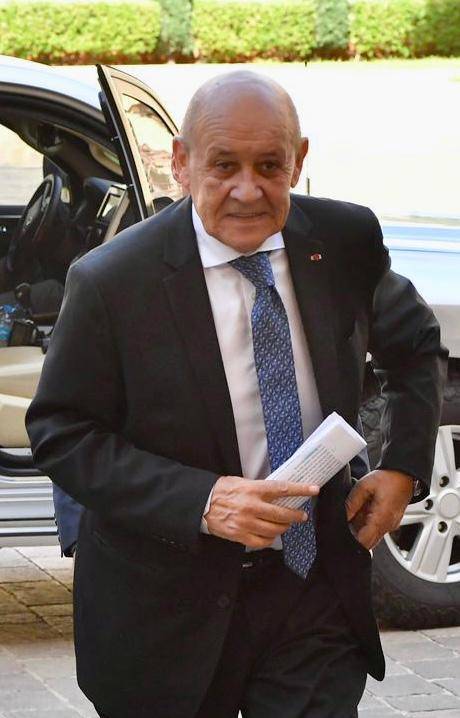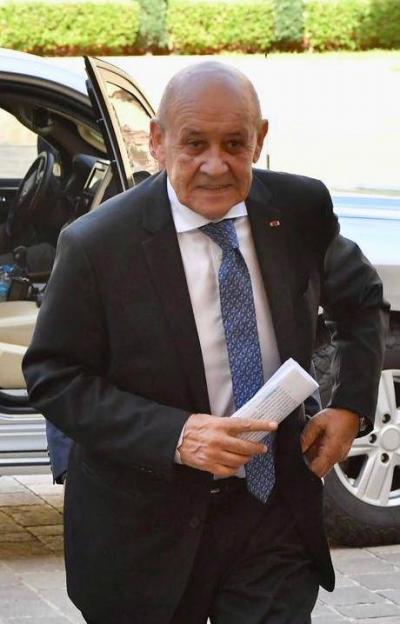In Beirut for the third time as a presidential envoy, former French Foreign Minister Jean-Yves Le Drian is exploring possibilities, at least on the first day of his visit. According to private sources closely following Le Drian's tour, he is attempting to "merge the ideas he previously proposed with the dialogue initiative of the Speaker of the Parliament, Nabih Berri." The sources confirmed that the French envoy "does not want to propose any approach or present any plan before completing his Lebanese tour," and the only thing he expressed clearly was his "positive view of President Berri's invitation."
According to the same sources, no new French proposals were detected, and by the end of the tour, it will become clear whether the French role has truly reached a dead end or not. Sources present at some of the French meetings stated that Le Drian, representing the French side and the quintet committee, "has given positive signals regarding the issue of Lebanese-Lebanese dialogue." In this context, the sources noted that "Berri's proposal complements Le Drian's and continues the French initiative after facing a parliamentary rejection to respond to his message or accept his invitation for dialogue at the Pine Palace."
In light of the positivity mentioned by the same sources, they saw that "after a short period, the signs of progress will begin to crystallize." The first stop was at the Grand Serail, where he was received by Prime Minister Najib Mikati, who reiterated during the meeting that "the beginning of the solution to the current crisis in Lebanon requires electing a new president and completing economic reforms, especially the projects in the Parliament, to put the country on the path to recovery."
For his part, the French envoy asserted that he "came to Lebanon to complete his mission" and would not express his opinion before finishing communications and meetings. He hoped "that the initiative announced by Speaker Nabih Berri would mark the beginning of a solution path." Present at the meeting were the French Ambassador to Lebanon, Hervé Magro, and Mikati's advisors, former Minister Nicolas Nahas, and Ambassador Boutros Assaker.
Le Drian then headed to Ain el-Tineh, where he met with Speaker Nabih Berri, and discussed the general situation and political developments, particularly the presidential election. After the meeting, Speaker Berri confirmed that "there is a consensus with Le Drian that dialogue is the only way out of the current crisis and to achieve the presidential election, and this is what is available now for those who want Lebanon's interest."
Le Drian also met with Army Commander General Joseph Aoun at his office in Yarzé, where he was briefed on the security situation and the challenges facing the army, especially the Syrian displacement and the Palestinian situation. Le Drian affirmed "his country's continued support for the army to enhance its capabilities in carrying out various missions."
In the evening, the personal representative of the French president, Jean-Yves Le Drian, continued his tour of political leaders by meeting with the head of the Marada Movement, Sleiman Frangieh, at the home of his son, MP Tony Frangieh, in Beirut. They discussed the current political situation and ways to "complete the presidential elections amidst all the pressing crises." They also emphasized the importance of dialogue as an essential and necessary entry point to achieving the presidential election as soon as possible, according to a statement released by the Marada media.
The meeting was attended by French Ambassador to Lebanon Hervé Magro, MP Tony Frangieh, and former Minister Rony Araiji. In Mirna Chalouhi, Le Drian met with head of the Strong Lebanon bloc, MP Gebran Bassil, in the presence of MP Nada Boustani. The Free Patriotic Movement had previously announced that it welcomes dialogue provided it is solely related to the presidential election, with clear agreements on its duration, venue, and subject, and that it concludes with the election of a president, whether through agreement or open sessions.




